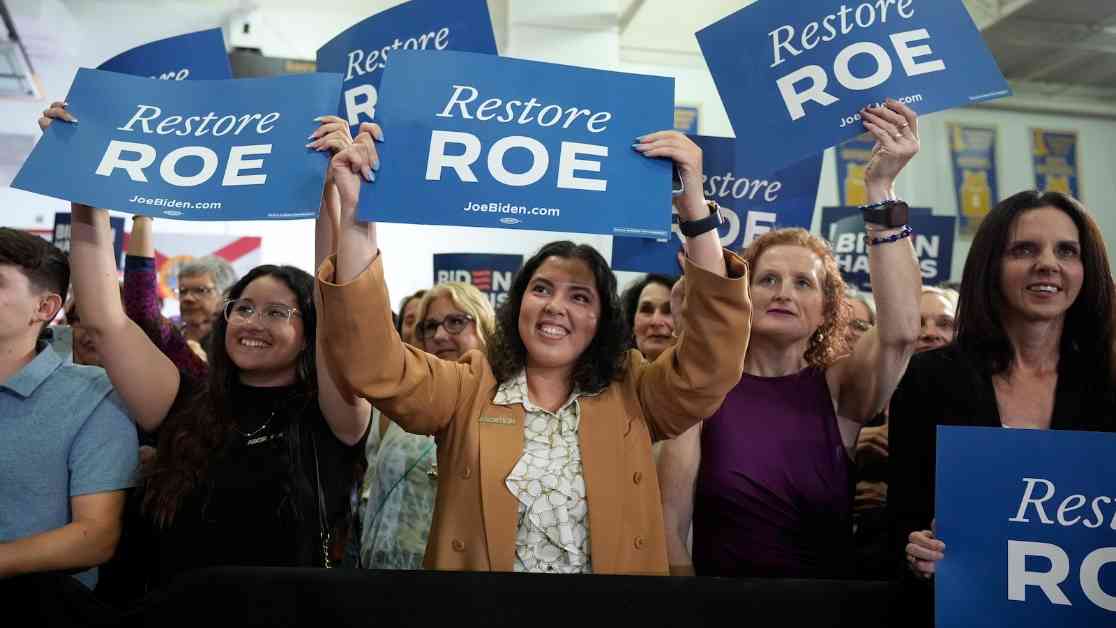State police in Florida have been making visits to voters’ homes to question them about signing a petition to get an abortion rights amendment on the ballot in November. This has raised concerns among voters and critics alike, who see it as a move by Republican officials to block the measure. The state health care agency has also launched a website targeting the ballot initiative with politically charged language, further adding to the controversy surrounding the issue.
The ballot initiative, known as Amendment 4, aims to enshrine abortion rights in Florida law. If approved by 60% of voters, the procedure would remain legal until the fetus is viable, as determined by the patient’s health care provider. However, recent actions by the state government have sparked debate and accusations of voter intimidation.
Isaac Menasche, one of nearly a million people who signed the petition to get the measure on the ballot, shared his experience of being questioned by law enforcement at his home in Lee County. He expressed his surprise at the visit, stating that he simply felt strongly about the issue and signed the petition when given the opportunity. Critics argue that these visits are part of a larger effort to intimidate voters and suppress access to abortion in the state.
State Democratic Party Chair Nikki Fried condemned the actions of Governor Ron DeSantis, accusing him of using state power to interfere with the citizen-led process of getting reproductive freedom on the ballot. She described the visitations as a desperate attempt to sway public opinion before Election Day and potentially violate state laws against voter intimidation.
Amendment 4 has garnered support from a diverse group of nearly one million Floridians, spanning across party lines. The Yes on 4 campaign director, Lauren Brenzel, emphasized that the initiative was driven by people who believe in the freedom to make their own health care decisions, rather than politicians dictating their choices. However, the state government’s efforts to target the ballot amendment have raised concerns about the fairness of the upcoming vote.
Governor DeSantis defended the police visits to petition signers’ homes, citing concerns about the legitimacy of the signatures. He claimed that some of the signatures were allegedly from deceased individuals, prompting an investigation into potential petition fraud. Despite the deadline to challenge signature validity having passed, county-level election administrators have been contacted by state officials to review verified petition signatures as part of the probe.
Mary Jane Arrington, Supervisor of Elections in Osceola County, expressed confusion over the state’s request to review signatures that had already been deemed valid by her office. She questioned the motives behind the state’s investigation into signature petition fraud, especially considering the thorough verification process conducted by election administrators.
The state’s elections crime unit has initiated over 40 investigations into paid petition gatherers working for the Amendment 4 campaign. Deputy Secretary of State Brad McVay shared that the unit is actively looking into potential instances of fraud related to the petition signatures. However, previous criminal cases brought by the Office of Election Crimes and Security have been dismissed by judges, raising doubts about the validity of the investigations.
In addition to the police visits, a state health care agency launched a website targeting Amendment 4, using language that emphasizes “Protecting Life” and warns against misinformation spread by opponents of the amendment. Governor DeSantis defended the website as a means of providing factual information to Floridians about the upcoming ballot measure, denying any political bias in its content.
The controversy surrounding Amendment 4 in Florida reflects a broader trend of challenges faced by abortion rights advocates across the country. In states like Nebraska and Missouri, legal battles over ballot initiatives and competing measures have created confusion and delays in the process. The fight for reproductive rights continues to be a contentious issue with far-reaching implications for women’s healthcare and autonomy.
As the debate over Amendment 4 in Florida intensifies, voters and advocates are closely monitoring the developments leading up to the November election. The outcome of this ballot initiative could have significant implications for the future of abortion rights in the state and beyond. The controversy surrounding the state government’s actions highlights the importance of protecting democratic processes and ensuring fair and transparent elections for all citizens.


















